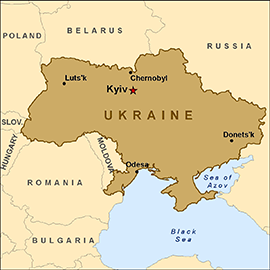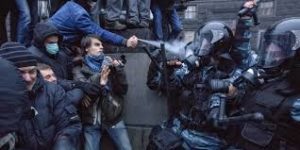
Facing bankruptcy, Ukraine, in the autumn of 2013, turned its back on the west by allowing Russia to purchase $15 billion worth of government bonds. The purchase was intended to prevent Ukraine from defaulting on its loans in 2014. The deal also included Moscow lowering the price of gas sold to the Ukraine by one-third. Now that deal is in shambles as Vladimir Putin’s Russian Army occupies Crimea once part of Ukraine.
For more on this, we go to Moscow where Alec Luhn is standing by. Alec is “The Nation” magazine’s Moscow correspondent and he has just returned from Kiev.
David: Alec, thank you for joining us.
Alec Luhn: Thanks for having me.
David: Kiev is the capital of “The Ukraine?” Can I call it “The Ukraine” or “Ukraine?”
Alec: I would call it Ukraine. It’s actually an interesting linguistic difference historically in Russia, they often called Ukraine with a word in front of it that would be loosely translated as “The Ukraine,” but now after the independence of Ukraine, after the breakup of the Soviet Union, it is more politically correct, at least from the Ukrainian point of view to say “Ukraine.”
Although not all Russians…some Russians continue to say “The Ukraine.”
David: Is Ukraine a European country?
Alec: Ukraine is a very divided country and I don’t think you can call all of it a European country. There is definitely European leaning, the western half of Ukraine has a lot of not just etiological ties with Europe but also some definite European cultural things that appear. Everything as simple as coffee shops and things like this that aren’t as popular in the eastern part of Ukraine, to just having a more open or friendly manner that is different from the Russian leaning Eastern half of Ukraine, which very much resembles Russia and is dominated by Russian speakers and people who see their country as strongly linked to Russia.
It’s really split, I would say, between a more European half and or more Russian half.
David: Geographically speaking though, it borders Poland. It could join NATO and if it were perceived as a European nation, it would be the second largest European nation in the EU.

Ukrainian protestors succeeded in toppling its Russia friendly government only to lose Crimea the next week.
Alec: Absolutely. It’s got I think about 48 million people is the population so it’s a fairly large nation. It has borders with yes, Poland, Hungary, and definitely there is a strong trend within Ukraine, especially right now, that sees its destiny as linked with Europe’s destiny and sees the country as a part of Europe.
But again, in the East and the South of the country, is a very different view of what Ukraine is, and I’ve been to those parts of the country as well and there, people not only speak Russian, many of them, and not only have a culture and a way of life that more closely resembles Russia, but they definitely see their country as strongly linked both historically and culturally and economically to Russia.
David: So there’s nationalism. There’s the Ukrainian identity, or is that up for grabs? I mean what is the Ukrainian identity? When people sing the national anthem, what are they singing to?
Alec: That is still a big question and actually that’s one of the most important questions. One of the most important issue that’s been raised right now with the giant street protest in Kiev, which are known as “Euro Maidan.”
“Maidan” is allegedly the square where they are taking place in central Kiev. There is definitely a movement to continue to basically create a Ukrainian national identity because for the last 20 years before the Soviet Union broke up, Ukraine underwent a strong process of Russification. It had a Soviet leader of the country who was beholding to Moscow and who engaged in a process to Russify Ukraine.
It had very little chance in the past to develop its own nationality. Even before Soviet times, Ukraine, the Western half that was part of the all so Hungarian Empire. It was also ruled by Poland for a while. The Eastern part was ruled by Russia for a long time. It really hasn’t had a chance except for the past 20 years to develop a nationality identity as Ukraine within its current borders.
That’s been happening in the past 20 years and now, it has really kicked into high gear I think with these protests in the center of Kiev.
Let me just add quickly too to really highlight this “split country” idea. You can look at electoral results in Ukraine, especially for Presidential elections, and almost every time it’s split straight down the middle where the Western half of the country will vote for the more European leaning candidate, and the Eastern half of the country will vote for the more Russia leaning candidate.
The Presidents have actually flip-flopped and have switched in that manner where at first it was a pro-Western President, then a more pro-Russian President, then Viktor Yuschenko was more pro-European President, and now Viktor Yanukovych, the current President who was elected in 2010, is definitely a more Russian leaning President, which he has proved beyond all doubt by signing the deal of Putin.
